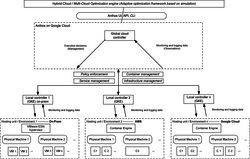An adaptive scheduling framework for the dynamic virtual machines placement to reduce energy consumption in cloud data centers

Optimized (multi-) Cloud Scenarios and Operations – Preliminary Results.
The future vision of IT-industry is shifting toward a utility-based offering of on-demand computational power. However, the massive expansions of IT-system landscapes and infrastructure triggered many alarms on different levels regarding the efficiency of utilization them, their associated operational costs, and their CO2 emission footprint. The majority of contribution in the examined literature that address IT resources management in data centers exhibits either a specific or a generic nature. The specific solutions are designed to solve specific problems, but yet neglecting the dynamic nature of IT-systems. The design of generic solutions usually overlooks many details of the investigated problems that have an impact on the possible optimization potential. Therefore, we propose an adaptive scheduling framework to address scheduling problems taking into account multi-objective optimality measures. The framework is motivated by a hybrid design to combine the use of heuristic and metaheuristic approaches. The perused narrative in such implementation is combining some advantages of heuristic and metaheuristic approaches such as: the light execution time of heuristics and the robustness as well as the quality of metaheuristic approaches. For the design of the optimization model, we rely on Genetic Algorithms (GA) to select different heuristics for the allocation of virtual machines overtime.
The evaluation of the framework is conducted based on real cloud workloads obtained for 10 random days from PlanetLab using a simulation framework. PlanetLab is a well-known benchmark that is used in many previous research. A total of 560 hosts of four different types are included taking into account the placement and live migration of different types of virtual machines. The proposed framework is at least 30.77 % and up to 45.39 % more power efficient in comparison to eight state-of-the art heuristics of previously published research. We observed that there is a 0.04 % increase in the SLA violation in comparison to the other heuristics. In addition, the proposed approach is about 65.05% more energy efficient when compared to the basic algorithms with no live migration capabilities. Our investigation suggests that the hybrid approach outperforms the heuristic based approaches in terms of energy consumption while maintaining an acceptable quality of service and robustness of the system. We are looking forward to implement the presented concept on common cloud platforms to conduct further experiments using real infrastructure. This will also make use of recently released technology that enables a central management of multi-cloud IT-Infrastructure, such as Google Anthos, which implies that the optimization and the operation of not only hybrid-cloud but also multi-cloud scenarios can be tested.



